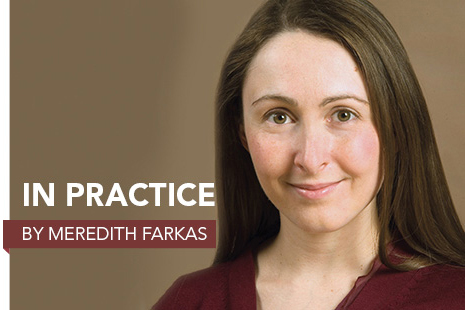
I have learned so many things from other librarians that have saved me time and a good amount of trial and error. While preparing to implement a chat reference service at my library in 2005, I perused blog posts, articles, presentation slides, and library websites that shared lessons learned from other institutions. I therefore avoided many rookie mistakes and successfully implemented a service that is going strong nine years later.
We spend a lot of energy trying to create things from scratch when, frequently, another library may have already done something very similar. Looking to see what’s already out there before starting a new project can help save time and avoid repeating the mistakes of others. Years ago, when I was looking to develop the protocol for an ethnographic study, I found Andrew Asher and Susan Miller’s free and practical manual, So You Want to Do Anthropology in Your Library?, which answered most of my initial questions.
Looking at what other libraries have done doesn’t necessarily mean following them in lockstep, but much can be learned from people who have tackled projects before us. Libraries seeking to build an easy-to-use video production studio can look to Penn State’s One Button Solution, which is meticulously written for other librarian’s benefit. Want a cheaper digital display option? A librarian at the Somerset County (N.J.) Library System created one using Raspberry Pi and can show you how to do the same. I’d heard about these two examples at the ALA Annual Conference last summer, but documentation on them is easy to find online.
Our ability to benefit from the experiences and creations of other librarians depends on our own willingness to share when we do something novel. When you’ve finished a long and exhausting project, sharing information about how you did it and what you learned is often the last thing you want to do. But no one else will benefit from your hard-earned experience if you don’t. If you’ve benefited from what someone else has freely shared, don’t you owe it to the community to do likewise?
In addition to inertia, some people don’t share because they don’t think what they have done is particularly novel or exciting. I often feel that way myself, but I’m almost always wrong. What’s the harm in sharing even something mundane or imperfect? Others could still benefit from your approach to building tutorials, the children’s program you did last week, or your display idea.
Sometimes the barriers are on the institutional end, where librarians who’ve done great work are prevented from sharing what they did or open sourcing an application. Administrators should advocate for—not squelch—sharing and openness. Sharing the good work done at your institution not only gives back to the community from which you’ve probably benefited, but it is also great PR for your library.
Last year, in my previous job at Portland (Oreg.) State University, I led a team that developed Library DIY, a system for making bite-sized chunks of instructional content available for point-of-need learning. I shared information about the project on my blog and also advocated for the software infrastructure to be open-sourced. While I had to field quite a few questions from other librarians looking to replicate Library DIY, it was worth the relatively small investment of my time to help many other libraries and their patrons.
We are fortunate to be part of a profession so generous in sharing expertise. In the interests of conserving energy across the profession and improving libraries, borrow liberally and share generously.


